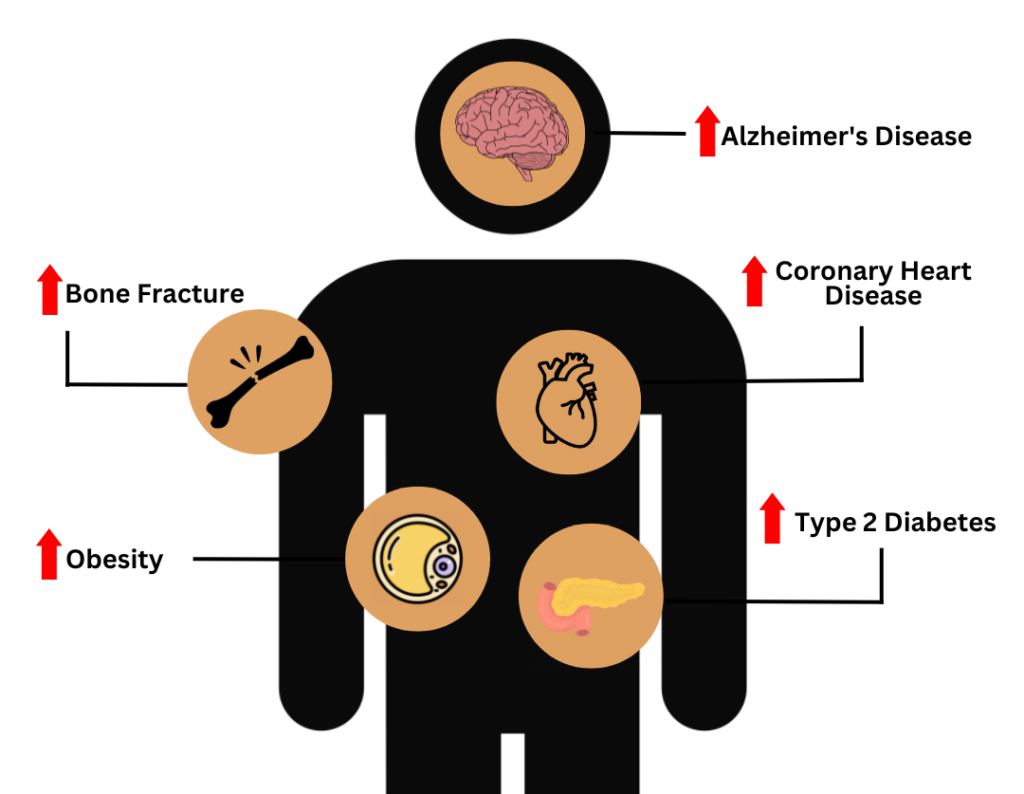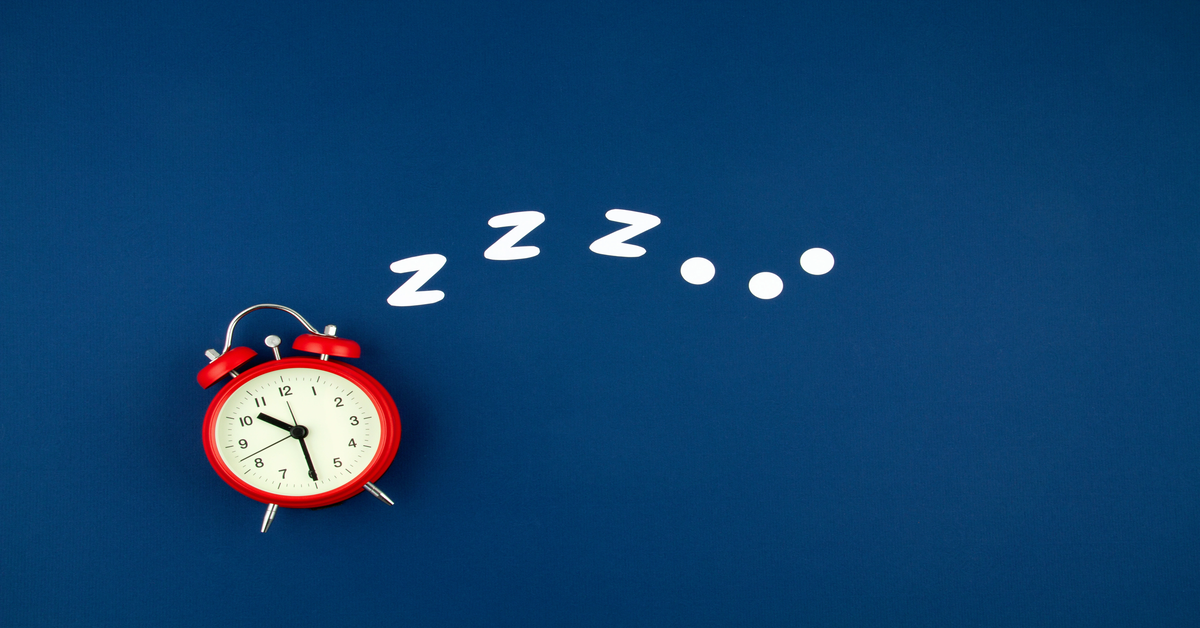SLEEP
The impact of sleep on the overall health of the body is significant. Sleep is a vital physiological process that is necessary for the health and wellbeing of the body. It is during sleep that the body is able to repair and restore its systems, including the brain, immune system, and metabolism. The impact of sleep extends beyond just physical health, with sleep deprivation linked to a range of negative cognitive and emotional outcomes. With the importance of sleep becoming increasingly recognized, research has begun to shed light on the mechanisms underlying its benefits and the consequences of insufficient sleep.
Table of Contents
- Why Do We Need Sleep?
- What Changes Occur In The Sleep Patterns of Older Adults?
- Can You Compensate for Sleep Deprivation by Getting Extra Sleep?
- Can Inadequate Sleep Lead to Negative Health Outcomes?
- How Can Diet Affect Sleep?
- Does Exercising in the Evening Negatively Affect Sleep?
- Insomnia
- How Does Caffeine Affect Sleep?
- How Does Alcohol Affect Sleep?
- How Does Blue Light Affect Sleep?
- How Does Sun Exposure Influence Sleep?
Why Do We Need Sleep?
Sufficient sleep plays a critical role in maintaining overall health and well-being. It is essential for supporting brain function, reducing the risk of various diseases, strengthening the immune system, maintaining good mental health, and promoting physical recovery. According to the National Sleep Foundation, adults aged 18 and above should aim to get a minimum of 6 hours of sleep per night.
The connection between sleep deprivation and obesity is well-established, and it is believed to be a result of alterations in eating habits, physical activity levels, and hormonal regulation.
What Changes Occur In The Sleep Patterns of Older Adults?
Older adults often struggle to get enough sleep despite having similar sleep needs as young and middle-aged adults. According to certain research, sleep deficiencies in older individuals may not be an inevitable consequence of aging, but instead could be linked to other underlying health conditions.
Irrespective of the underlying reasons, insufficient or excessive sleep has been linked to elevated risks of mortality from cardiovascular disease and cancer. According to some scientists, the adverse health consequences linked to prolonged sleep may be attributed to the lower quality of sleep caused by interruptions during the night.
Can You Compensate for Sleep Deprivation by Getting Extra Sleep?
Insufficient sleep for several nights can result in fatigue, irritability, and impaired cognitive function. Adenosine accumulation in the brain is a significant factor in causing drowsiness and can be reduced by adequate sleep. The adenosine hypothesis suggests that sleep debt, caused by an excess of adenosine in the brain, can be resolved by obtaining better sleep in the future. Recent studies conducted on animals suggest that the idea of “catching up” on lost sleep may not hold true. Prolonged periods of sleep deprivation can lead to long-term brain injury due to increased oxidative stress and inflammation, which can aggravate neurodegeneration.
It is not yet clear if the same mechanisms are present in humans, but studies have shown that extended sleep deprivation can have a negative impact on cognitive function, and even after several days of adequate sleep, full recovery may not occur. [1] This indicates that prolonged periods of sleep deprivation could result in long-term adverse effects on the brain, which cannot be compensated by a few days of proper sleep.
Can Inadequate Sleep Lead to Negative Health Outcomes?
Inadequate sleep or poor sleep quality has been associated with various negative health outcomes, highlighting the crucial role of sleep in maintaining overall health. Here are some of the health issues that have been linked to poor sleep:
- Coronary heart disease: Sleeping for less than 7 hours per night is linked to an increased risk of coronary heart disease (CHD) and cardiovascular disease (CVD) mortality. [1] Furthermore, a genetic study discovered that a short sleep duration of 6 hours or less per night was causally associated with an increased risk of coronary heart disease, high blood pressure, and heart attack.
- Obesity: A correlation has been found between insufficient sleep and a greater likelihood of developing obesity. [1] Research has demonstrated that limited sleep, as little as 4 hours a night, can cause an increase in hunger, calorie intake and ultimately result in weight gain in as little as 5 days. [1] In contrast, a clinical trial showed that extending sleep duration from 5.9 to 7.1 hours per night resulted in a decrease in caloric intake and a reduction in body fat after 2 weeks.
- Alzheimer’s disease: Sleep problems and poor sleep quality are associated with an increased risk of Alzheimer’s disease. Additionally, a shorter duration of sleep has been linked to a faster rate of cognitive decline. [1] The connection between poor sleep and Alzheimer’s disease could be linked to the glymphatic system, which is a biological system that seems to clear the brain of beta amyloid, a protein that is associated with Alzheimer’s disease. [1]
- Type 2 diabetes: According to a meta-analysis of around one million individuals, sleeping for six or fewer hours per night was found to be linked to a higher risk of developing type 2 diabetes. A causal association between sleep problems and diabetes is suggested by a genetic study that found insomnia to increase the risk of type 2 diabetes.
- Bone fracture: Sleep problems, such as insomnia and sleep disturbances, as well as short sleep duration (less than 7 hours per night), are linked to a greater risk of bone fractures, possibly due to an increased risk of falls. [1, 2] Genetic studies have also shown a correlation between poor sleep, low bone mineral density, and an increased risk of bone fractures. [1]
- Depression: Getting less than seven hours of sleep per night is linked to an increased risk of depression. Similarly, experiencing insomnia is also associated with a higher likelihood of developing depression, and treating insomnia has been found to improve depressive symptoms. [1, 2]

How Can Diet Affect Sleep?
The sleep architecture of an individual can be affected by changes in their dietary pattern. According to a meta-analysis, high carbohydrate intake is associated with an increase in rapid-eye movement (REM) sleep, while low carbohydrate intake is associated with an increase in non-rapid-eye movement (non-REM) sleep.
Observational studies have reported a link between the consumption of a diet rich in “healthy foods” like fruits, vegetables, seafood, etc and better sleep quality. To put it simply, having a well-balanced and nutrient-dense diet could potentially improve the quality of sleep.
According to current thinking, the impact of a carbohydrate-rich or high-glycemic-index meal on sleep is believed to be related to its influence on the levels of tryptophan, an essential amino acid. To elaborate, consumption of high-glycemic-index carbohydrates results in an increase in insulin levels that stimulates the uptake of large neutral amino acids (LNAAs) into muscles.
Since, LNAAs compete with tryptophan for transport across the blood-brain barrier, lower levels of blood LNAAs result in a higher tryptophan-to-LNAA ratio, so more tryptophan can travel to the brain. As a result of more tryptophan entering the brain, there is an increase in the production of serotonin. This increase in serotonin production leads to the secretion of melatonin, which is a hormone that induces sleep, resulting in feelings of sleepiness.
Does Exercising in the Evening Negatively Affect Sleep?
According to a 2021 meta-analysis, engaging in high-intensity exercise 2-4 hours before bedtime does not have a negative impact on sleep. Instead, it can lead to an increase in total sleep time by around 16 minutes and a reduction in the time it takes to fall asleep by around 5 minutes. However, if the high-intensity exercise lasts for more than 30-60 minutes, it may have a small negative impact on rapid-eye movement sleep, reducing it by around 3%.
A study conducted over seven weeks with elite youth soccer players found that engaging in high-intensity exercise in the evening did not impact sleep quality. Additionally, participants reported feeling slightly more tired at bedtime on exercise nights compared to nights without exercise.
Main Takeaway: High-intensity evening exercise does not appear to negatively affect sleep.
Insomnia
Insomnia is a prevalent sleep disorder that involves poor-quality sleep or insufficient sleep caused by difficulties in falling or staying asleep. The condition can be temporary, lasting for a few days or weeks, or chronic, persisting for at least three months. Approximately 10-15% of the general population suffers from insomnia, with a higher incidence in women during and after menopause, as well as in older adults. Up to 50% of older adults report experiencing insomnia or sleep disturbances. [1]
Insomnia can have various underlying causes, such as job-related stress, interpersonal problems, or traumatic experiences. Medical conditions, medications, and other sleep disorders such as obstructive sleep apnea can also trigger insomnia. Additionally, consumption of substances like caffeine, tobacco, and alcohol can lead to insomnia. However, in some cases, insomnia is classified as a primary condition because there is no identifiable cause. Long-lasting emotional distress, stress, travel, and shift work are risk factors for primary insomnia.
How Does Caffeine Affect Sleep?
The suprachiasmatic nucleus (SCN), a cluster of cells located near the optic nerve, primarily controls the circadian clock in humans. It responds to various stimuli, including light that enters the eye.
Caffeine increases the levels of cyclic AMP (cAMP) in a cell, which is typically produced inside the cell in response to a signal. This is achieved through two mechanisms: firstly, caffeine blocks adenosine receptors that normally inhibit cAMP production; secondly, caffeine binds to phosphodiesterase enzymes that break down cAMP, thereby inhibiting their activity. When these enzymes are blocked, cAMP levels are raised.
Research has demonstrated that the regulation of circadian rhythms within the SCN involves the release of calcium ions triggered by the activation of ryanodine receptors, which can also be influenced by caffeine.
How Does Alcohol Affect Sleep?
Alcohol can help you fall asleep, but this effect fades off after a few days if you keep drinking close to bedtime and right from the start, it will impair the quality of your sleep. [1] It has been suggested that alcohol-use disorders may be linked to insomnia, but it is unclear whether one causes the other.
Main Takeaway: It is not recommended to rely on alcohol as a means to induce sleep, as it may initially help one relax but ultimately disrupt the quality of sleep. Therefore, avoiding alcohol consumption after dinner could be beneficial for promoting better sleep.
How Does Blue Light Affect Sleep?
More than the activities that you do before bed, it is excessive blue light exposure that can harm your sleep. The use of blue light-emitting devices like laptops, tablets and smartphones have this effect. [1]
How Does Sun Exposure Influence Sleep?
Sunlight exposure has effects beyond the production of vitamin D in our skin. It can also have a direct impact on the quality of our sleep by affecting our circadian rhythms. Elderly nursing home residents who are exposed to more sunlight may experience improvements in their scores for sleep quality.
Employees working in offices without windows experienced lower sleep quality compared to those working in offices with windows. Antarctica workers in the winter can use bright sun lamps to compensate for the negative effects of sunlight under-exposure on sleep.







